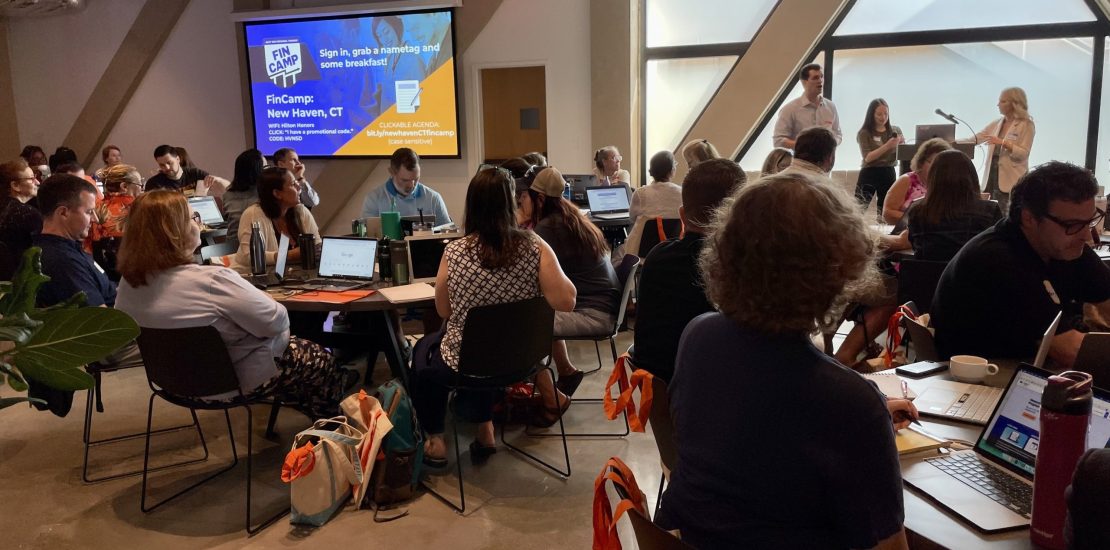- August 22, 2024
- Posted by: Regent Harbor Team
- Category: Finance

Contents
A Gathering of Connecticut’s Educators
In a bustling New Haven conference centre, Christian Sherrill sought to corral the attention of 150 teachers. They were wrapping up a classroom activity and engaging in animated conversations about their results. Some were refilling their water bottles, while others checked their mobile phones.
“If you can hear my voice, clap once," Sherrill’s voice resonated through the room. A few people clapped, easing the clatter somewhat. "If you can hear my voice, clap twice." More eyes turned towards the presentation screen, and most of the chatter subsided.
New Financial Literacy Requirement
The activity was a personal budgeting exercise aimed at teachers from middle and high schools around Connecticut. They gathered on this sunny summer day to experiment with lesson plans, ask questions, and gain the confidence needed to teach a newly mandated course: personal financial management and financial literacy.
Last year, Governor Ned Lamont signed legislation requiring a half-credit financial literacy course to graduate from Connecticut’s public schools. He hailed it as “one of the most important instructional tools for economic independence and stability.”
[RELATED: CT high schoolers now need a financial literacy course to graduate]
The Challenge and the Support
State Treasurer Erick Russell, in his testimony supporting the bill, highlighted that many schools already offered a personal finance course as an elective. However, the large cities lacked these programs, exacerbating achievement and wealth gaps. Since the legislation’s passage, districts have been striving to catch up.
Nonprofit groups like California-based Next Gen Personal Finance (NGPF) have been instrumental in this effort. They offer free lesson plans and professional development seminars for teachers, similar to the one in New Haven. NGPF hosted 15 such workshops, known as “FinCamp,” across the country during the summer, with Connecticut’s being the largest.
An Engaging Budgeting Exercise
Sherrill kicked off the day’s proceedings with a personal budgeting exercise called “Budget Frenzy.” Participants imagined themselves at 22, sharing a flat with a roommate, and deciding how to allocate a somewhat arbitrary budget on various items presented onscreen. The choices ranged from dining with friends to buying a new smartphone, with some decisions having long-term consequences.
“Budgeting decisions have consequences,” Sherrill reminded as he moved onto the next item. After the activity, he engaged the teachers in a discussion on how to tailor the game for their students, and demonstrated where to find related lesson materials on NGPF’s website.
New Tools and Techniques
Later, NGPF instructor Amanda Volz introduced a lesson on credit card mechanics. Teachers were asked to imagine a student wanting to purchase a big-ticket item on credit. Using a free online tool, they calculated the interest and total costs involved. For a $900 iPhone example, the interest totalled $421. Adjusting the monthly payment to $50 reduced the interest to $177, creating a notable “aha moment” among the participants.
The Teachers’ Perspective
Cynthia Lisinicchia, a math teacher at Bridgeport Military Academy, expressed her interest in the curriculum. She shared her personal experiences of financial missteps, such as signing up for a credit card in college and purchasing a new sports car without negotiating. “I’m always telling my students it’s not about how much money you make, but what you do with it,” she said.
Meanwhile, Gwen Rice, a math teacher from West Haven High School, explained how she’d utilised the credit card tool in her classes. She plans to integrate more robust financial curriculum in her upcoming course on investing.
A Future-Oriented Event
At a reception following FinCamp, Treasurer Erick Russell commended the teachers. “There are a lot of things I wish I knew earlier, like managing compounding interest and financing education,” he said. “The tools you’re imparting on students are practical skills they’ll use every day of their lives.”
Programs like these are significant steps towards empowering the next generation with the financial knowledge they need to navigate adulthood confidently.
Additional Resources
For more information:
- Next Gen Personal Finance
- CT Financial Scholars
- Compounding Interest Explained
- Financial Literacy in Schools
Relevant Tables and Lists
| Budget Frenzy Activity | Item | Decision Outcome |
|---|---|---|
| Lunch with friends | Immediate expense, social benefit | |
| New smartphone | High immediate cost, long-term benefit | |
| Oil change | Moderate cost, avoids higher future repair costs |
Helpful Financial Tips for Students
- Understand the basics of budgeting and saving.
- Learn how credit cards work and the importance of paying off the balance.
- Be wary of making large purchases without negotiation.
By equipping our students with these financial skills, we set them on the path towards informed and responsible adulthood.
